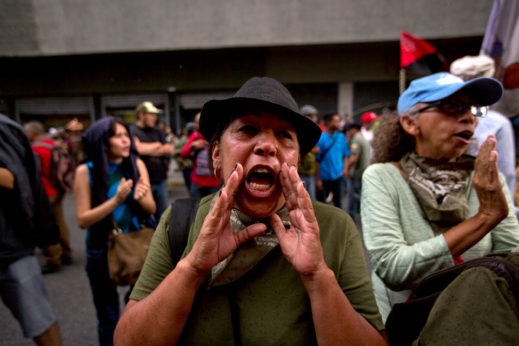
In late October, the Communist Party of Venezuela (PCV) called for an “urgent” meeting with President Nicolás Maduro to discuss a series of government shortcomings in the area of workers’ and campesinos’, or peasant farmers, rights.
The proposed meeting, according to the general secretary of the PCV, Óscar Figuera, should be held “with the gloves off” and in the context of the electoral agreement between the ruling United Socialist Party of Venezuela (PSUV) and the PCV.
The Communists accuse the government of not fulfilling any of the points of the February accord. The government is yet to respond to the call from its allies, despite continuing negotiations that seek to achieve a unified PSUV-PCV list of candidates for the coming local elections.
Speaking to the press last month, Figuera drew Maduro’s attention to the “inaction” and “lack of response” of public authorities to the demands of the organized campesinos and in particular those of the Admirable March. Their demands include the handing over of title deeds to land, an end to state- and military-backed landlord violence, often including paramilitaries or hired thugs, and greater efficiency and less corruption in government schemes for helping campesinos to increase national production.
Following a successful reception by President Maduro, the joint working groups established by the government and the marching campesinos have stalled, forcing the latter to stage a short-lived hunger strike to force the government to address these issues.
Since Maduro met the campesinos, promising to put an end to landlord-backed attacks, a number of assassinations and attacks have taken place, particularly in the provinces of Barinas and Zulia (Sur de Lago). “Campesino leaders have received threats and persecutions [from landlords], and the competent authorities such as the police, the National Guard, and others, do not act,” Figuera declared. He characterized those authorities as “complicit” and “permissive” in the “aggressive policies” of the landed classes.
He reiterated that the campesinos will “always find the Communists on their side.”
The PCV also called on the attorney general, Tarek William Saab—who is at present reviewing a series of investigations by his predecessor, Luisa Ortega Díaz, now a fugitive—to “take a look at those who should be investigating in Barinas,” where local landlords recently murdered the campesino leaders Reyes Orlando Parra, Pedro Vielma, and José del Real Aguilar.
Last month, the police authorities formally charged those captured for the murders, who are now awaiting trial. Attacks continued, however, in Sur de Lago, where campesinos condemned the wounding of a campesino leader, allegedly by the previous owners of a disputed plot of land.
Figuera also denounced the fact that the PCV campesino leader in Barinas, Robinson García, suffered an attempt on his life last week when bikers hired by landlords fired fifteen shots into his truck. García is heavily involved in defending the campesinos’ demands in the region.
Another of the main points the Communist Party wishes to discuss is what it considers “insufficient” adjustments in the wage scales of public employees following the coming into effect of macro-economic reforms in August.
Public sector workers in many industries have held a series of demonstrations to demand new collective contracts and an adjustment in bonus schemes following the reconversion of the national currency. In several companies, new collective contracts have been agreed between the Ministry of Labor and the pro-government Bolivarian Trade Union Federation, which the PCV claims has lost touch with workers’ demands. “There have been meetings, the topic is being worked upon,” but the results have been “unacceptable,” he said, citing oil and transport workers, among others.
He also urged the national government, which the PCV does not participate in, to “listen to the people” and promote the “leading role” of the organized work force, claiming that the PCV has information showing that the new wage scales do not follow the proposals and demands discussed by the workers at the grassroots level.

Figuera’s demand was illustrated this week after workers took over the abandoned factory of Smurfit Kappa Cartones de Venezuela in Valencia, Carabobo state. The government responded to the workers’ request that it assume legal ownership of the factory, which was left derelict when the company’s owners left the country without following the due procedures to cease production, in what is classed as an illegal closure under Venezuelan law.
Following the petition, the minister of labor, Eduardo Piñate, visited the offices of the company in Valencia, making the takeover official, in compliance with article 149 of the Labor Law.
Last month, during a meeting with the workers’ congress, Maduro had railed against private-sector sabotage and urged workers to take over companies abandoned by the owners. “From now it will be a goal for the working class to recuperate the productivity of this firm,” Piñate stated on signing the transfer papers. He also commended the workers for their firm support of the Bolivarian process.
“We, the Valencia-based factories of corrugated cardboard, produce 80 percent of the national packaging,” one worker claimed, “and we can say that 80 percent of the factories are [now] operational with the support of the workers.” They are also planning on producing packaging for the pharmaceutical and food industries, he said. “The workplace of Smurfit Kappa Cartones de Venezuela SA is reactivated after the illegal closing by the bosses, so as to protect the jobs of hundreds of workers and their families.”












Comments